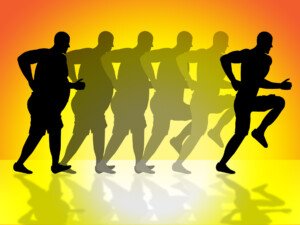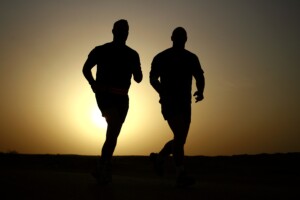If you want to lower your fast resting heart rate without drugs that can cause side effects, there are at least five natural ways to do this.
A normal pulse at rest should be between 60 and 100 beats per minute.
First, it would be helpful to learn if your fast resting heart rate is being caused by ongoing anxiety.
In fact, just the act of taking one’s pulse for one minute could make it speed up, due to the anxiety of finding out what it is.
But even if you suffer from anxiety, there are still five ways to naturally slow down your resting heart rate; no drugs required, says Yaser Elnahar, MD, a cardiologist with Hunterdon Cardiovascular Associates in NJ.
Dr. Elnahar recommends the five natural approaches below.
Medical Cause of a Fast Resting Heart Rate
Dr. Elnahar says that you should first find out if there could be a medical issue causing your elevated resting pulse, such as hyperthyroidism or anemia. Blood tests can show if there’s an abnormality.
There is a cause of a fast resting pulse that many people never consider: too much exercise.
“Too much” doesn’t necessarily mean a lot of time at the gym. The time must also include a lot of strenuous work.
For some workout enthusiasts or very competitive athletes, overtraining can lead to a fast heart rate – at rest – along with slower recovery periods and moodiness.
So if you’re a serious gym rat or athlete who feels burned out and whose progress has stalled, see if paring back a bit won’t slow down your pulse.
Lose Excess Weight
One’s heart rate may be sped up at rest to subsidize a heavy body. Slowing down a fast heartbeat is one of the many benefits of losing unneeded pounds.

Both cardio and strength training will help you with this.
Also practice portion control. Fill up more on fruits, nuts and salads, and less on bread, pasta, cereal and baked goods.
Eat fruit instead of juice, and eat nuts instead of munchies.
Reduce Caffeinated Products
Drink only caffeine-free beverages. In fact, if you drink a lot of soda, it’d be healthier to replace most of that soda with water.

If you love coffee, see how drinking decaffeinated goes. You might just find that it’s just as enjoyable. Same with tea.
Cardio Workouts
If you aren’t into exercise, it’s time to get going, no matter your age or body weight. Just start doing something that’s continuous and rhythmic and that gets your heart rate elevated.

Yes, aerobic exercise will elevate your heart rate – but during the exercise. The exercise will strengthen your heart so that it doesn’t have to beat as fast to keep your body oxygenated the rest of the time.
Dr. Elnahar recommends a daily aerobic session of 30 to 45 minutes.
If you’re into serious strength training, you’ll want to do the cardio on your non-weight training days.
If you decide to use a treadmill, do not hold on. Here’s why.
How is your sleep?
Are you getting at least six hours? If not, you absolutely must. If you’re too busy to get between seven and eight hours of sleep, take inventory of your late night activities and see what you can cut out.

Perhaps the culprit occurs earlier in the day and pushes everything out to late night.
For example, are you getting home from work at 7:00 or 8:00 pm due to overtime? This will push everything you need to do after work to a few hours later, delaying your bedtime.
Reassess your need to work overtime, or perhaps you’re spending a few hours after work “unwinding” at a bar.
Can you give this up – or at least some of it — and go straight home instead?
Or maybe to unwind, you can go to a gym after work, spend less time there than you would at the bar, and kill two birds with one stone: getting home earlier and doing the exercise that can naturally treat your fast heart rate.
Sometimes, life just gets in the way of sleep, but usually, if you sit down and carefully go through your schedule and activities, you’ll be able to make some cuts and free up your evenings more so that you can get to bed earlier.
And one more thing: If you smoke, QUIT. Smoking raises resting heart rate while you’re smoking, and that certainly doesn’t help.
 Dr. Elnahar has publications in the Journal of Atrial Fibrillation, the Journal of Clinical Medicine and Research, Reports in Medical Imaging, and more.
Dr. Elnahar has publications in the Journal of Atrial Fibrillation, the Journal of Clinical Medicine and Research, Reports in Medical Imaging, and more.
 Lorra Garrick has been covering medical, fitness and cybersecurity topics for many years, having written thousands of articles for print magazines and websites, including as a ghostwriter. She’s also a former ACE-certified personal trainer.
Lorra Garrick has been covering medical, fitness and cybersecurity topics for many years, having written thousands of articles for print magazines and websites, including as a ghostwriter. She’s also a former ACE-certified personal trainer.
.










































